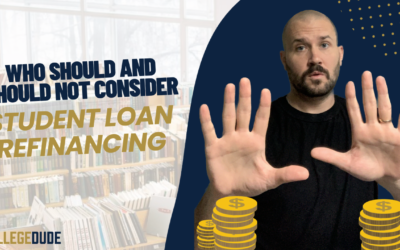There’s a lot to keep up with as far as student loans. The past year included multiple attempts to cancel or delay repayments. It’s not clear where things are going. It’s confusing. I’m keeping up with it and want to share what I see. Here are the things to know about student loans in February 2023
10. Suspended Loan Payments
The Department of Education has suspended student loan payments on most federal student loans. The Administration first began the suspension of most federal student loan payments in March 2020 and continues to keep it in place until the ongoing litigation involving the forgiveness plan issued by President Biden is resolved or implemented. Barring no further setbacks, the Department of Education will resume payments 60 days after announcing its action, unless it takes further action.
9. But Not Private Loans
Payments for private loans do not fall under this umbrella. Lending institutions and banks offer private loans. Private loans do not fall under the same classification as the Direct Loans do.
8. Interest Rates Apply
The Department of Education will set the interest rate for undergrad students who took out Direct Loans between July 1, 2022 and July 1, 2023 at 4.99% once the current payment pause ends. For any PLUS loans (typically taken out by parents), the interest rate is 7.54%. For graduate students, the interest rate will be 6.54%.
7. Employer Match
The (very) recently passed SECURE Act 2.0 allows an employer to match an employee’s student loan repayment contribution to the employer-sponsored plan (such as a 401(k) plan). Previously, employers could only match employee contributions. This marks a big change, as recent graduates with large minimum student loan payments previously were left picking between saving for retirement or repaying student loans. This provision allows for both.
6. Federal Rate Increase
In December, the federal funds rate increased to 4.25-4.5%. There is also much speculation that rates will continue to rise. The expected increase in interest for both federal and private loans will be driven by the Direct Loans that are set at a certain percentage, and the private loans that will vary based on bank rates, credit of the borrower, and repayment terms.
5. There’s Some Time
There will still be some time before we have resolution on the public student loan one-time forgiveness program. The Supreme Court has set dates for the Biden administration and the challengers to submit legal briefs and their replies to the Court. Currently, the last date set is February 15th for the Biden administration to reply to any challengers briefs. It’s expected a decision would be released in June, after oral arguments take place sometime in early spring.
4. FAFSA Changes in 2024
There will be upcoming changes, starting in July of 2024, where incoming borrowers will be subject to fewer questions on the Free Application for Federal Student Aid (FAFSA). This will allow for (hopefully) less confusion, and more of a streamlined process for parents and students alike, as they fill out the necessary information to receive financial aid.
3. Income-Driven Repayment
The Direct Loans can be repaid with income-driven repayment plans. These allow for more affordable monthly payments, and are based on your income and family size. Borrowers should utilize these plans if the payment creates an undue burden, and if they are seeking Public Service Loan Forgiveness.
2. Timeline?
Legal challenges have pushed back the start date for repayment on Direct Loans from Jan 1, 2023. The Department of Education has now postponed the start date of repayment 8 times after the initial freeze, which spanned 2 presidential administrations.
1. Fresh Start
The Biden administration has given borrowers currently in default a “fresh start” and allows them to enter back into repayment in good standing.
Summary of 10 Things to Know about Student Loans in February 2023
Each of these items affect borrowers or parents of students differently. It’s important to speak to a tax professional for your specific taxable liability and how each of these credits or deductions could work. Or reach out to me for a better idea of how you can apply these to your financial plan!






